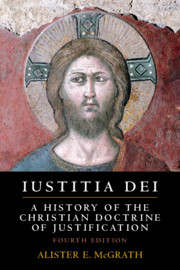Book contents
- Iustitia Dei
- Iustitia Dei
- Copyright page
- Contents
- Tables
- Preface to the Fourth Edition
- Abbreviations
- Introduction
- Part I Justification
- Part II The Middle Ages
- Part III Protestantism
- 11 Is There a ‘Reformation’ Doctrine of Justification?
- 12 Luther’s Early Approach to Justification
- 13 Justification in Lutheranism, 1516–1580
- 14 Reformed Theology, 1519–1560
- 15 The English Reformation
- 16 Protestant Orthodoxy
- 17 Anglicanism
- 18 Puritanism
- 19 Pietism
- Part IV Catholicism
- Part V The Modern Period
- Conclusion
- A Brief Glossary of Medieval Soteriological Terms
- Works Consulted
- Index
16 - Protestant Orthodoxy
from Part III - Protestantism
Published online by Cambridge University Press: 27 January 2020
- Iustitia Dei
- Iustitia Dei
- Copyright page
- Contents
- Tables
- Preface to the Fourth Edition
- Abbreviations
- Introduction
- Part I Justification
- Part II The Middle Ages
- Part III Protestantism
- 11 Is There a ‘Reformation’ Doctrine of Justification?
- 12 Luther’s Early Approach to Justification
- 13 Justification in Lutheranism, 1516–1580
- 14 Reformed Theology, 1519–1560
- 15 The English Reformation
- 16 Protestant Orthodoxy
- 17 Anglicanism
- 18 Puritanism
- 19 Pietism
- Part IV Catholicism
- Part V The Modern Period
- Conclusion
- A Brief Glossary of Medieval Soteriological Terms
- Works Consulted
- Index
Summary
Chapter 16 considers the development of the doctrine of justification in Lutheran and Reformed Orthodoxy in the late sixteenth and early seventeenth centuries. Justification was understood by both Protestant communities as an essentially forensic notion. However, there were important divergences between the two, particularly in relation to their understanding of the nature of predestination and the role of a covenant between God and humanity. The chapter analyses the convergences and divergences between Lutheran and Reformed Orthodoxy on the question of the objective grounds and subjective appropriation of justification, before exploring the much greater emphasis placed on the covenantal context of justification in several sections of Reformed theology. Finally, the chapter considers the degrees of continuity that can be identified between the original approaches to justification found in the writings of Luther and Calvin and those found in their Orthodox successors.
Keywords
- Type
- Chapter
- Information
- Iustitia DeiA History of the Christian Doctrine of Justification, pp. 237 - 251Publisher: Cambridge University PressPrint publication year: 2020



